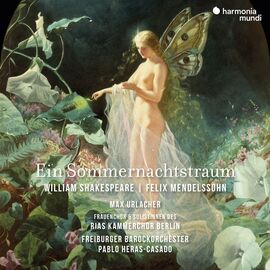Dies Album präsentiert Mendelssohns vollständige Musik zum Sommernachtstraum, mit allen Melodramen. Pablo Heras-Casado dirigiert zupackend intensiv, aber auch wunderbar farbig und flimmernd, also sehr klangmalerisch.
Das Freiburger Barockorchester spielt auf historischen Instrumenten und überzeugt an allen Pulten, so dass immer die richtige Stimmung aufkommt.
Für die Aufnahme ist nur ein Schauspieler beschäftigt, der alle Rollen in der des Erzählers vereint.
Max Urlacher ist ein versierter Schauspieler, der als Puck ebenso brilliert wie als Oberon, Theseus oder sogar als Titania. Der deutsche Text für diese Produktion basiert auf Schlegels klassischer Übersetzung und wurde so adaptiert, dass man der Abfolge der Ereignisse gut folgen kann.
Alle Nummern der Bühnenmusik werden also mit viel Vitalität und Inspiration gespielt, ohne dass die Atmosphäre verfälscht oder der Komponist verraten wird. Selbst der berühmte Hochzeitsmarsch wird flüssiger gestaltet als üblich, aber Mendelssohn bleibt es dennoch, mit viel frischen Farben, zarten Tönen und sehr viel Stimmung.
Besser in Erinnerung habe ich freilich die Nicholas Ofczarek-Kristjan Järvi-Aufnahme bei Preiser Records (2007) sowie die gesamte Bühnenmusik, allerdings ohne gesprochenen Texte mit dem Gewandhausorchester Leipzig unter Riccardo Chailly (Decca 2013).
This album presents Mendelssohn’s complete music for A Midsummer Night’s Dream, including all the melodramas. Pablo Heras-Casado’s conducting is grippingly intense, but also wonderfully colorful and shimmering, in other words, true tone painting.
The Freiburg Baroque Orchestra plays on period instruments and is convincing at all stands, so that the right mood is always created.
Only one actor is employed for the recording, combining all the roles in that of the narrator. Max Urlacher is an accomplished actor who is just as brilliant as Puck as he is as Oberon, Theseus or even Titania. The German text for this production is based on Schlegel’s classic translation and has been adapted so that the sequence of events is easy to follow.
All the numbers of the incidental music are therefore performed with great vitality and inspiration, without distorting the atmosphere or betraying the composer. Even the famous wedding march is played more fluently than usual, but it still remains Mendelssohn, with lots of fresh colors, delicate tones and a great deal of atmosphere.
I certainly remember the Nicholas Ofczarek-Kristjan Järvi recording on Preiser Records (2007) better, as well as the complete incidental music, albeit without spoken texts, with the Gewandhausorchester Leipzig under Riccardo Chailly (Decca 2013).





















